|
|
|
Sort Order |
|
|
|
Items / Page
|
|
|
|
|
|
|
| Srl | Item |
| 1 |
ID:
116675
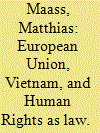

|
|
|
|
|
| Publication |
2012.
|
| Summary/Abstract |
The year 1995 marked a major watershed for modern Vietnam. It completed its post-Cold War strategy of "multilateralizing" its foreign policy by joining ASEAN, normalizing relations with the US, and signing a comprehensive framework agreement with the EU. All three are recognized as major accomplishments for modern Vietnamese diplomacy. However, in the EU-Vietnam framework agreement, Hanoi made an unprecedented concession when it agreed to the human rights clause in the treaty. For the very first time, Vietnam had accepted an explicit, legally binding stipulation on human rights in a bilateral treaty. This remarkable development resulted from the confluence of three major dynamics. First, Hanoi had committed itself to establish sound relations with all major economic centers-of-gravity at the time, ASEAN, the US, and the EU. Second, the EU also was keenly interested in stronger relations with Asian countries but was flexible about prioritizing any particular bilateral relationship. Third, Brussels' diplomats had to work off a treaty template when negotiating fundamental bilateral agreements. The standard EU framework agreement at the time included a human rights clause. In 1995, the EU was insisting that any treaty with Vietnam would have to include a clause on human rights. Initially, Hanoi rejected such a treaty provision, and the negotiations stalled. However, when Hanoi realized that Brussels felt no urgency to complete the treaty and was unable to compromise on human rights, Vietnam's leadership reconsidered. In order to complete the strategy of "multilateralizing" its international affairs, Vietnam had to accept the human rights clause in the treaty with the EU.
|
|
|
|
|
|
|
|
|
|
|
|
|
|
|
|
| 2 |
ID:
103507


|
|
|
|
|
| Publication |
2011.
|
| Summary/Abstract |
This article shows mainly how the administrators and workers in the Thang Long cigarette factory in Hanoi coped with a deepening food shortage from the 1970s to the mid-1980s. When the government could not provide a stable supply of food or prevent rising food prices on the open market, the factory administrators organized food-related programmes for their workers, such as eating halls, rest homes and schools for workers' young children. But these programmes could not meet the workers' needs during the crisis years, so they relied on themselves. They pursued a variety of activities, including increasing their working hours, seeking other jobs outside and pursuing illicit activities to earn extra money. The evidence in this article further indicates that the Vietnamese government modified its policies as it tolerated deviations from its socialist vision of a centralized economy.
|
|
|
|
|
|
|
|
|
|
|
|
|
|
|
|
| 3 |
ID:
028685


|
|
Hanoi
/ McCarthy, Mary
|
1968

|
|
|
|
| Publication |
London, WeidenFeld and Nicolson, 1968.
|
| Description |
138p.hbk
|
| Standard Number |
297177001
|
|
|
|
|
|
|
|
|
|
|
|
Copies: C:1/I:0,R:0,Q:0
Circulation
| Accession# | Call# | Current Location | Status | Policy | Location |
| 001866 | 959.7043/MCC 001866 | Main | On Shelf | General | |
|
|
|
|
| 4 |
ID:
029014


|
|
|
|
|
| Publication |
London, Today Publications Ltd., 1970.
|
| Description |
8p.pbk
|
|
|
|
|
|
|
|
|
|
|
|
Copies: C:1/I:0,R:0,Q:0
Circulation
| Accession# | Call# | Current Location | Status | Policy | Location |
| 006528 | 959.7043/DUN 006528 | Main | On Shelf | General | |
|
|
|
|
| 5 |
ID:
140854


|
|
|
|
|
| Summary/Abstract |
In the peri-urban zones of many South East Asian cities, capital has flowed into the development of new, middle class urban enclaves. A significant body of scholarship sees these places as embodying some of the worst elements of American-style suburban, gated communities: sterile, disconnected from their surroundings, isolating wealthy people from the surrounding urban life, etc. While it is no doubt true that such a negative view is frequently warranted, through a closer examination of two projects in peri-urban Hanoi, the authors show that Vietnam's new urban enclaves can hardly be assimilated into the hermetically sealed enclaves described in much of the critical literature. The study cases from Hanoi reveal much more porosity: a strong influence of traditional modes of housing production and allocation, a mixing of built forms and the integration of the new enclaves into the surrounding communities.
|
|
|
|
|
|
|
|
|
|
|
|
|
|
|
|
| 6 |
ID:
114665
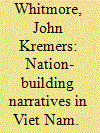

|
|
|
|
|
| Publication |
2012.
|
| Summary/Abstract |
In late 1972 (December 18-30), the Christmas Bombing of Hanoi in the
Democratic Republic of Viet Nam by the U.S. Air Force took place. Three weeks
later, the American author arrived and witnessed the destruction and how the
Vietnamese had already fitted this 'Battle of the B-52s' into their centuries old narrative
of resistance to foreign invasion. This article recounts the people and situations that he
met on this visit and the ways Vietnamese of all kinds viewed the battle as a great
victory for their land, one reinforcing their sense of past, present, and future.
|
|
|
|
|
|
|
|
|
|
|
|
|
|
|
|
| 7 |
ID:
103108
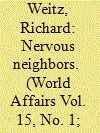

|
|
|
| 8 |
ID:
150078
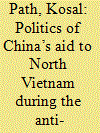

|
|
|
|
|
| Summary/Abstract |
Behind the public display of Sino–North Vietnamese unity in the anti-American resistance during the height of the People’s Republic of China’s Cultural Revolution from 1965 to 1969, Beijing’s insistence on Hanoi’s acceptance of Maoist ideology coupled with its assertive demand for Hanoi to denounce Soviet revisionism politicised its economic and technical assistance to North Vietnam. Although appreciating Beijing’s enthusiasm to aid North Vietnam, the Democratic Republic of Vietnam [DRV] resented Beijing’s political and ideological objective of promoting Maoism and anti-Soviet revisionism in North Vietnam. In response, the DRV government asserted independent decision-making and bureaucratic control over the management of foreign economic and technical aid, which in turn collided with the Chinese assertion of superiority and insistence on their control over all China-aided projects. The fragmentation of Chinese bureaucratic institutions and the political chauvinism of some radical Maoists at the Chinese Embassy in Hanoi, who oversaw Chinese aid to North Vietnam, further hindered Beijing’s ability to exert significant influence over Hanoi.
|
|
|
|
|
|
|
|
|
|
|
|
|
|
|
|
| 9 |
ID:
190149


|
|
|
|
|
| Summary/Abstract |
Cities of the Global South constitute a wide band in terms of their integration into the global economy. For cities like Hanoi, the sustained influx of foreign direct investments has propelled them into playing increasingly important roles as manufacturing centres. Along with this new role is the influx of expatriate managers who watch overseas manufacturing subsidiaries. Our paper focuses on Korean expatriate neighbourhoods and their impacts on Hanoi. More specifically, we show how the presence of such communities has resulted in important changes in the host city, firstly in housing typology (such as the introduction of high-rise mixed-use complexes), and secondly, in cultural consumption. We argue that Korean privilege, cultural consumption practices, and the desire for support and solidarity within the Korean social network in Hanoi work to create new forms of city-building knowledge, one that originates from the neighbourhoods of these new and rich settlers in the city. Such forms of knowledge subsequently go on to reshape the economic, cultural and social spaces in the globalising city.
|
|
|
|
|
|
|
|
|
|
|
|
|
|
|
|
| 10 |
ID:
106749
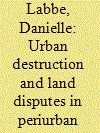

|
|
|
|
|
| Publication |
2011.
|
| Summary/Abstract |
This paper discusses the recent rise in land disputes in the rapidly urbanizing outskirts of Hanoi. It presents emerging social conflicts as resulting from a clash between the rules and practices of urbanization as devised and regulated locally by periurban people and the territorialization projects that municipal authorities and land developers try to impose on them. At the heart of these conflicts are expropriations of large tracts of periurban land by state-backed developers and the reforms of local institutions that facilitate this process. Using the case of a village recently annexed to the city, this paper examines how local people resort to contentious politics to resist this urban encroachment. The paper finds that groups of elderly villagers assumed a leading role in crafting and deploying acts and discourses of resistance, relying on state-promoted values to support their claim. It further suggests that, while periurban villagers acknowledge the necessity of integrating their locality into Hanoi's urban fabric and governance system, they rise up when this process threatens moral relationships inherited from the prerevolutionary and collectivization periods.
|
|
|
|
|
|
|
|
|
|
|
|
|
|
|
|
| 11 |
ID:
181706


|
|
|
|
|
| Summary/Abstract |
The rising tension between China and Vietnam with regard to the South China Sea has revised Hanoi's approach to its national defence policy. No longer benign and mute, it is taking an assertive stance and vocalising its opposition to the historical claims of Beijing. Hanoi is also becoming much more open to American presence in the South China Sea. This article examines the impact of geostrategic competition in the South China Sea on United States (US)–Vietnam and Indo-Vietnam bilateral relations, providing Hanoi an opportunity to challenge Beijing's illegal claims in the region.
|
|
|
|
|
|
|
|
|
|
|
|
|
|
|
|
| 12 |
ID:
149180


|
|
|
|
|
| Summary/Abstract |
Starting in the 2000s, there has been a rise in youth-led appropriation of public spaces in Hanoi, Vietnam. Through case studies of skateboarders and traceurs (practitioners of parkour) in two of the city’s formal public spaces, we explore and analyze the tactics deployed by these young urbanites to claim a part of the characteristically overcrowded and socio-politically restrictive public spaces of the Vietnamese capital. These case studies show that, by seeking to access issue_image_89_3_Hanoi Youth_Skateboardpublic spaces for their new activities, skaters and traceurs have had to confront multiple sets of rules, imposed by not only the state, but also corporate actors and resident-driven surveillance. We find that skateboarders and traceurs deal with these forms of control largely through small-scale, non-ideological, and non-confrontational tactics. As a result, these youth practices have become normalized in Hanoi’s public spaces. These findings broaden the discourses on everyday urbanism and social-political transformations in post-socialist urban contexts, and shed light on the ways in which contemporary youths engage with the city.
|
|
|
|
|
|
|
|
|
|
|
|
|
|
|
|
|
|
|
|
|